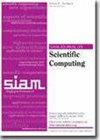二阶问题的光谱延迟校正方法
IF 2.6
2区 数学
Q1 MATHEMATICS, APPLIED
引用次数: 0
摘要
SIAM 科学计算期刊》,第 46 卷第 3 期,第 A1690-A1713 页,2024 年 6 月。 摘要。谱延迟修正(SDC)是一类用于常微分方程数值解的迭代方法。SDC 可以解释为一种 Picard 迭代法,用于解决用低阶方法预处理的全隐式配位问题。对于一阶问题,使用显式、隐式或隐式-显式欧拉法和其他低阶方法作为预处理,SDC 已得到广泛研究。对于一阶问题,SDC 可达到任意精度阶数,并具有良好的稳定性。虽然已有将 SDC 应用于二阶洛伦兹方程的数值结果,但还没有将 SDC 应用于二阶问题的理论结果。我们以速度-韦勒为基础方法,对一般二阶初值问题的 SDC 的收敛性和稳定性进行了分析。我们的分析证明,收敛阶数取决于系统中的力是否取决于速度。我们还证明了 SDC 迭代在某些条件下是稳定的。最后,我们证明了 SDC 比简单的 Picard 迭代或四阶 Runge-Kutta-Nyström 方法的计算效率更高。本文被授予 "SIAM 可重复性徽章:代码和数据可用性",以表彰作者遵循了 SISC 和科学计算界重视的可重复性原则。读者可通过 https://github.com/Parallel-in-Time/pySDC/tree/master/pySDC/projects/Second_orderSDC 获取代码和数据,以重现本文中的结果。本文章由计算机程序翻译,如有差异,请以英文原文为准。
Spectral Deferred Correction Methods for Second-Order Problems
SIAM Journal on Scientific Computing, Volume 46, Issue 3, Page A1690-A1713, June 2024.
Abstract. Spectral deferred corrections (SDC) are a class of iterative methods for the numerical solution of ordinary differential equations. SDC can be interpreted as a Picard iteration to solve a fully implicit collocation problem, preconditioned with a low-order method. It has been widely studied for first-order problems, using explicit, implicit, or implicit-explicit Euler and other low-order methods as preconditioner. For first-order problems, SDC achieves arbitrary order of accuracy and possesses good stability properties. While numerical results for SDC applied to the second-order Lorentz equations exist, no theoretical results are available for SDC applied to second-order problems. We present an analysis of the convergence and stability properties of SDC using velocity-Verlet as the base method for general second-order initial value problems. Our analysis proves that the order of convergence depends on whether the force in the system depends on the velocity. We also demonstrate that the SDC iteration is stable under certain conditions. Finally, we show that SDC can be computationally more efficient than a simple Picard iteration or a fourth-order Runge–Kutta–Nyström method. Reproducibility of computational results.This paper has been awarded the “SIAM Reproducibility Badge: code and data available,” as a recognition that the authors have followed reproducibility principles valued by SISC and the scientific computing community. Code and data that allow readers to reproduce the results in this paper are available at https://github.com/Parallel-in-Time/pySDC/tree/master/pySDC/projects/Second_orderSDC.
Abstract. Spectral deferred corrections (SDC) are a class of iterative methods for the numerical solution of ordinary differential equations. SDC can be interpreted as a Picard iteration to solve a fully implicit collocation problem, preconditioned with a low-order method. It has been widely studied for first-order problems, using explicit, implicit, or implicit-explicit Euler and other low-order methods as preconditioner. For first-order problems, SDC achieves arbitrary order of accuracy and possesses good stability properties. While numerical results for SDC applied to the second-order Lorentz equations exist, no theoretical results are available for SDC applied to second-order problems. We present an analysis of the convergence and stability properties of SDC using velocity-Verlet as the base method for general second-order initial value problems. Our analysis proves that the order of convergence depends on whether the force in the system depends on the velocity. We also demonstrate that the SDC iteration is stable under certain conditions. Finally, we show that SDC can be computationally more efficient than a simple Picard iteration or a fourth-order Runge–Kutta–Nyström method. Reproducibility of computational results.This paper has been awarded the “SIAM Reproducibility Badge: code and data available,” as a recognition that the authors have followed reproducibility principles valued by SISC and the scientific computing community. Code and data that allow readers to reproduce the results in this paper are available at https://github.com/Parallel-in-Time/pySDC/tree/master/pySDC/projects/Second_orderSDC.
求助全文
通过发布文献求助,成功后即可免费获取论文全文。
去求助
来源期刊
CiteScore
5.50
自引率
3.20%
发文量
209
审稿时长
1 months
期刊介绍:
The purpose of SIAM Journal on Scientific Computing (SISC) is to advance computational methods for solving scientific and engineering problems.
SISC papers are classified into three categories:
1. Methods and Algorithms for Scientific Computing: Papers in this category may include theoretical analysis, provided that the relevance to applications in science and engineering is demonstrated. They should contain meaningful computational results and theoretical results or strong heuristics supporting the performance of new algorithms.
2. Computational Methods in Science and Engineering: Papers in this section will typically describe novel methodologies for solving a specific problem in computational science or engineering. They should contain enough information about the application to orient other computational scientists but should omit details of interest mainly to the applications specialist.
3. Software and High-Performance Computing: Papers in this category should concern the novel design and development of computational methods and high-quality software, parallel algorithms, high-performance computing issues, new architectures, data analysis, or visualization. The primary focus should be on computational methods that have potentially large impact for an important class of scientific or engineering problems.

 求助内容:
求助内容: 应助结果提醒方式:
应助结果提醒方式:


